The Supreme Court has announced that the definition of a woman is based on biological sex in a landmark judgement.
Lord Hodge said that five Supreme Court justices had unanimously decided that ‘the terms woman and sex in the Equality Act refer to a ‘biological woman and biological sex’.
He recognised ‘the strength of feeling on both sides’ and cautioned against seeing the judgement as a triumph for one side over another, stressing that the law still gives trans people protection against discrimination.
But the decision could have far-reaching implications on how sex-based rights apply, including how women-only spaces are allowed to operate.
Conservative leader Kemi Badenoch insisted the ruling meant the ‘era of Keir Starmer telling us women can have penises has come to an end’.
The judgement marks the culmination of a long-running legal battle between the Scottish government and a women’s group over the definition of a ‘woman’ in Scottish legislation mandating 50 per cent female representation on public boards.
The case centred on whether somebody with a gender recognition certificate (GRC) recognising their gender as female should be treated as a woman under the 2010 Equality Act.
The Scottish government argued that such people are entitled to sex-based protections, while campaign group For Women Scotland (FWS) claimed they only apply to people that are born female.
The action sought to overturn a decision by the Scottish courts in 2023 which found that treating someone with a GRC as a woman under the Equality Act was lawful. The outcome will have implications in England, Scotland and Wales.
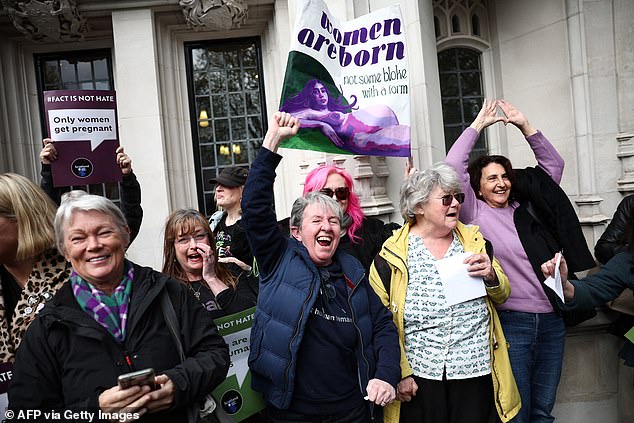
The Supreme Court has announced that the definition of a woman is based on biological sex in a landmark ruling. Pictured: Campaign group For Women Scotland celebrating the judgement
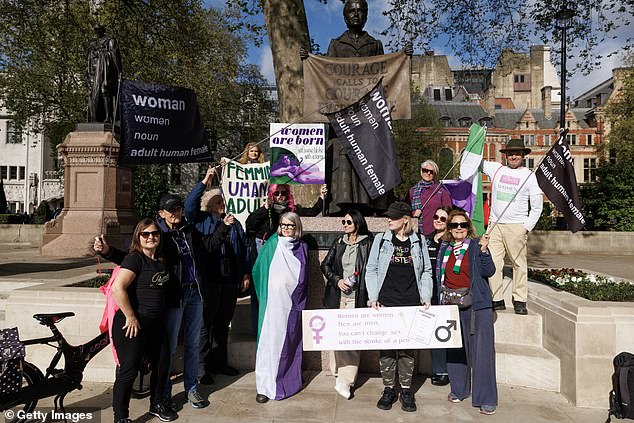
Lord Hodge said that five Supreme Court justices had unanimously decided that ‘the terms woman and sex in the Equality Act refer to a ‘biological woman and biological sex’
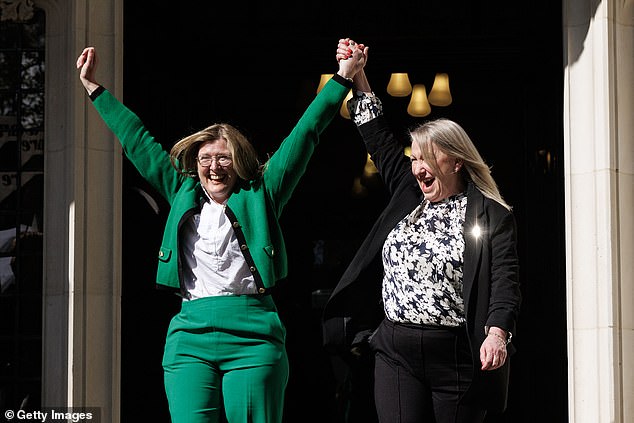
It marks the culmination of a long-running legal battle between the Scottish government and a For Women Scotland (FSW) over the definition of a ‘woman’ in Scottish legislation. Pictured: FSW directors Susan Smith (left) and Marion Calder (right)
In handing down the court’s judgement, Lord Hodge said: ‘The unanimous decision of this court is that the terms ‘woman’ and ‘sex’ in the Equality Act 2010 refer to biological woman and biological sex.’
‘In a judgement written by Lady Rose, Lady Simler and myself, with whom Lord Reed and Lord Lloyd-Jones agree, we unanimously allow the appeal,’ he added.
Lord Hodge said: ‘But we counsel against reading this judgement as a triumph for one or more groups in our society at the expense of another. It is not…
‘The Equality Act gives transgender people protection not only against discrimination through the protected characteristics of gender reassignment, but also against direct discrimination, indirect discrimination, and harassment, in substance in their acquired gender.’
He recognised the ‘strength of feeling on all sides’ which lies behind the case, adding: ‘On the one hand women, who make up one half of the population, have campaigned for over 150 years to have equality with men and to combat discrimination based on their sex. That work still continues.
‘On the other hand, a vulnerable and often harassed minority, the trans community, struggle against discrimination and prejudice as they seek to live their lives with dignity.’
The judgement was celebrated by women’s rights groups, who cheered outside the court after the ruling was handed down.
But a furious protester shouted ‘trans rights are human rights’ at those gathered, adding: ‘Even if you kill every last one of us another will be born tomorrow.’
Maya Forstater, chief executive of human rights charity Sex Matters which intervened in the case, said she is ‘delighted’ by the outcome.
She added: ‘We are delighted that the Supreme Court has accepted the arguments of For Women Scotland and rejected the position of the Scottish Government.
‘The court has given us the right answer: the protected characteristic of sex – male and female – refers to reality, not to paperwork.’
Conservative party leader Mrs Badenoch labelled the judgement as a ‘victory’ for women and praised campaign group FWS.
‘Saying “trans women are women” was never true in fact, and now isn’t true in law either,’ she said.
‘This is a victory for all of the women who faced personal abuse or lost their jobs for stating the obvious. Women are women and men are men: you cannot change your biological sex.
‘The era of Keir Starmer telling us women can have penises has come to an end.
‘Well done to For Women Scotland!’
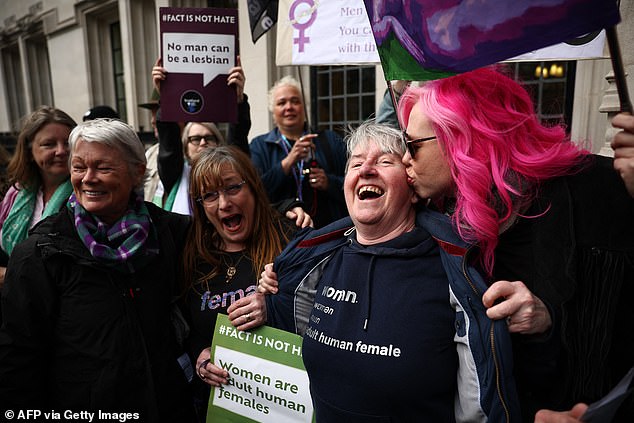
The judgement was celebrated by women’s rights groups, who cheered outside the court after the ruling was handed down
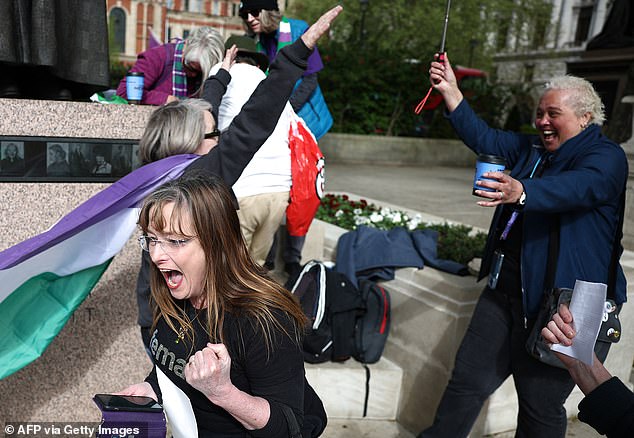
But a furious protester shouted ‘trans rights are human rights’ at those gathered, adding: ‘Even if you kill every last one of us another will be born tomorrow’
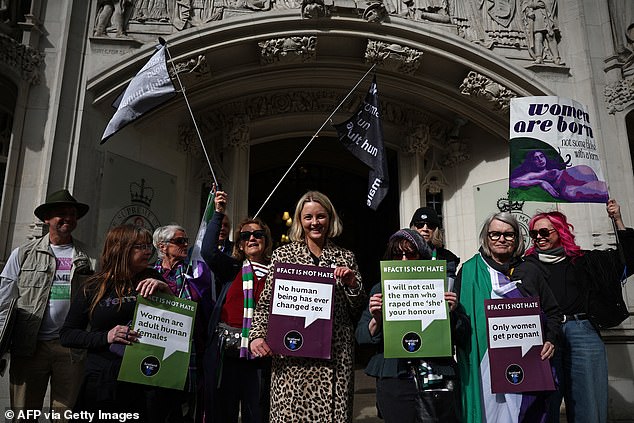
The case centred on whether somebody with a gender recognition certificate (GRC) recognising their gender as female should be treated as a woman under the 2010 Equality Act

The Scottish government argued that such people are entitled to sex-based protections, while campaign group FWS claimed they only apply to people that are born female
Kate Barker, chief executive of LGB Alliance which intervened in the case, described the judgment as a ‘profound relief’.
She said it marks a watershed moment in the fight for lesbian rights following years of mounting attacks, in particular from proponents of gender identity ideology.
‘The ruling confirms that the words ‘gay’ and ‘lesbian’ refer to same-sex sexual orientation and makes it absolutely clear that lesbians wishing to form associations of any size are lawfully entitled to exclude men – whether or not they possess a GRC,’ she said.
‘It is difficult to express the significance of this ruling: it marks a watershed for women and, in particular, lesbians who have seen their rights and identities steadily stolen from them over the last decade.’
Baroness Kishwer Falkner, chair of the Equality and Human Rights Commission, said: ‘Today the Supreme Court ruled that a gender recognition certificate does not change a person’s legal sex for the purposes of the Equality Act.
‘We are pleased that this judgment addresses several of the difficulties we highlighted in our submission to the Court, including the challenges faced by those seeking to maintain single-sex spaces, and the rights of same-sex attracted persons to form associations.
‘As we did not receive the judgment in advance, we will make a more detailed statement once we have had time to consider its implications in full.’
Lara Brown, Policy Exchange Senior Research Fellow for culture and identity, said: ‘By confirming that “sex” in the Equality Act 2010 means “biological sex”, the Supreme Court has secured women’s sex-based rights – rights to which they have always been entitled as a matter of law.
‘While this is a welcome victory, it should never have been left to the courts to answer the question of “what is a woman?.
‘Had the Government used their statutory powers to clarify that sex in the Equality Act 2010 means biological sex, when Policy Exchange called for them to do in 2023, the Scottish Ministers would never have been able to issue unlawful advice on the subject.’
A Government Spokesman said: ‘We have always supported the protection of single sex spaces based on biological sex.
‘This ruling brings clarity and confidence, for women and service providers such as hospitals, refuges, and sports clubs.
‘Single sex spaces are protected in law and will always be protected by this government.’
The Gender Representation on Public Boards (Scotland) Act 2018 is a piece of legislation intended to increase the proportion of women on public boards in Scotland.
In 2022, FWS successfully challenged the original act over its inclusion of trans women in its definition of women.
The Court of Session ruled that changing the definition of a woman in the act was unlawful, as it dealt with matters falling outside the Scottish Parliament’s legal competence.
Following the challenge, the Scottish Government dropped the definition from the act and issued revised statutory guidance – essentially, advice on how to comply with the law.
This stated that under the 2018 Act the definition of a woman was the same as that set out in the Equality Act 2010, and also that a person with a GRC recognising their gender as female had the sex of a woman.
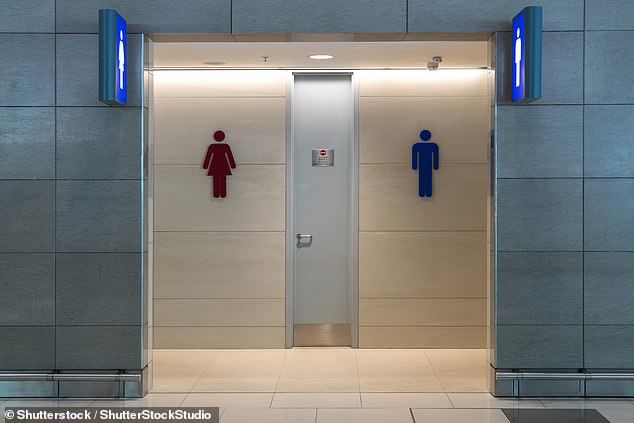
The judgement could have far-reaching implications on how sex-based rights apply, including how women-only spaces are allowed to operate
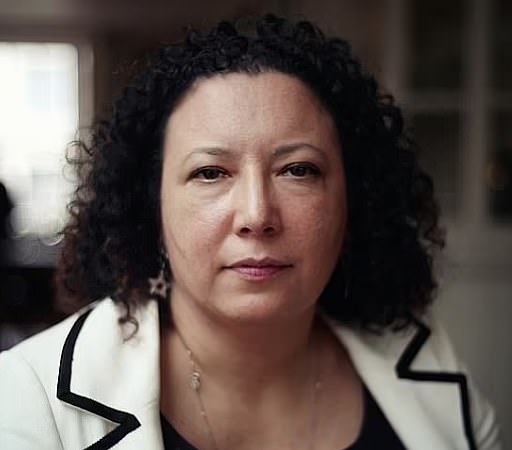
Maya Forstater (pictured) has campaigned for women’s rights and gender self-ID
FWS challenged this revised guidance on the grounds sex under the Equality Act referred to its biological meaning and said the Government was overstepping its powers by effectively redefining the meaning of ‘woman’.
However, their challenge was rejected by the Court of Session’s Outer House on December 13, 2022.
The Inner House upheld that decision on November 1, 2023 – but did grant FWS permission to appeal to the UK Supreme Court.
The appeal at the Supreme Court before Lord Reed, Lord Hodge, Lord Lloyd-Jones, Lady Rose and Lady Simler was heard last November and, after the two-day hearing, the judges said they would ‘take time to consider very carefully’ before issuing the judgment on April 16.
During the hearing, Aidan O’Neill KC, for FWS, told justices the Scottish ministers’ position that sex, man and woman in the Equality Act refer to ‘certificated sex’- as the sex on a person’s birth certificate which could be amended by a GRC – is ‘just wrong and should be rejected by the court’.
But Ruth Crawford KC, for the Scottish Government, said a person who becomes a woman ‘in consequence of a GRC’ is entitled to those protections ‘just as much as others enjoy those protections who are recorded as a woman at birth’.
She also said the ‘inevitable conclusion’ of the FWS challenge is that trans women with GRCs would ‘remain men until death for the purposes of the Equality Act’.
The court was also told that since the Gender Recognition Act was passed in 2004, 8,464 people in the UK had obtained a GRC.
When the group’s legal argument was published ahead of the appeal last year, FWS director Trina Budge said: ‘Not tying the definition of sex to its ordinary meaning means that public boards could conceivably comprise of 50% men, and 50% men with certificates, yet still lawfully meet the targets for female representation.
‘However, the ramifications of this case are much more far-reaching and all sex-based rights protected by the Equality Act are at risk.
‘The stakes are high and the court’s decision will have consequences for everyday single-sex services such as toilets and hospital wards.
‘It will determine whether a pregnant woman with a GRC is entitled to maternity leave, what it means to be same-sex attracted, and whether a man with a GRC’s entitlement to join a group of lesbians takes priority over their right to freely associate with only women.
‘Trans rights are protected under the separate category of gender reassignment but to fully guarantee women’s rights it is increasingly clear that a consistent, biological and factual understanding of sex is the only workable solution.’







